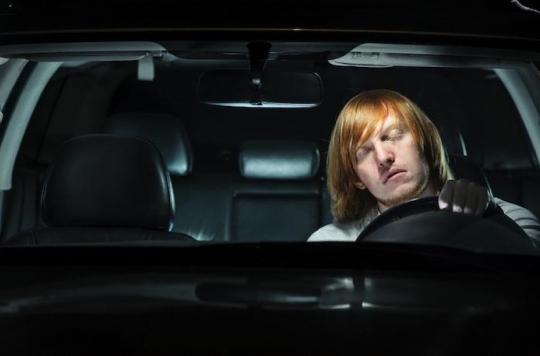Apnea and sleep disorders greatly increase the risk of a car accident. This finding is independent of the level of fatigue experienced by individuals.

Fatigue is responsible for one in three fatal accidents. Road safety campaigns regularly alert drivers to signs of fatigue. Itchy eyes, yawning, numbness of the legs, several things make it possible to identify a moment of fatigue and act accordingly: that is to say take a nap. A study carried out at Brigham and Women’s Hospital, and published on the BMC Medicine website, sheds new light on the risks associated with fatigue at the wheel. Sleep disorders are more dangerous than the fatigue experienced.
A badly felt lack of sleep
“We have proven that people who are chronically sleep deprived do not perceive themselves as very tired, and do not feel diminished,” says Daniel J. Gottlieb, lead author of this research. In fact, people who are prone to insomnia or sleep apnea are no longer aware of their fatigue. This increases their risk of having a car accident.
A risk increased by up to 123%
For this study, scientists looked at the cases of 1,745 men and 1,456 women aged 40 to 89. Severe sleep apnea increases the risk of having a car accident by 123% compared to people without this sleep disorder. When a person has moderate sleep apnea, this increased risk is 13%. Those who slept six hours a night had a 33% increased risk of a car accident, compared to those who slept seven or eight hours. According to the researchers, this increased risk of an accident did not depend on what the patients expressed in terms of perceived fatigue.
In France, 30% of people over 65 are affected by sleep apnea.
To find out more, a program from the VYV Fréquence Médicale channel: Neurological sleep disorders
Here is a very practical program which concerns the exercise of all doctors. Restless legs syndrome, sleepwalkers and night terrors, elderly people who cry and fall from their bed, hypersomnia, sleep apnea… Not to mention two highly publicized subjects: the influence of screens, whatever they are, TV, computer or smartphone, on the quality of sleep, and the “exploding head syndrome” that made the headlines last week. We are close to the questions we ask you every day! Our guest is a great specialist in these little-known but widespread sleep disorders! Isabelle Arnulf is indeed a professor and head of the sleep disorders exploration department at Pitié-Salpêtrière in Paris.
All the broadcasts of the VYV Fréquence Médicale channel:
https://www.youtube.com/channel/UCtNyuN_HFlNYO0-gqXwhLTg/playlists

To know more
Neurological sleep disorders
A program from the VYV medical frequency channel
Neurological sleep disorders… A very practical program which concerns the exercise of all doctors. – Restless legs syndrome… – Sleepwalkers and night terrors… – Elderly people who cry and fall from their bed… – Hypersomnia, sleep apnea… – Not to mention two highly publicized subjects: the influence of screens, whatever they are , TV, computer or smartphone, on the quality of sleep, and this “exploding head syndrome” which made the headlines last week… We are close to the questions we ask you every day! Our guest is a great specialist in these little-known but widespread sleep disorders! Isabelle Arnulf is indeed a professor and head of the sleep disorders exploration department at Pitié-Salpêtrière in Paris.
All the broadcasts of the VYV Fréquence Médicale channel:
https://www.youtube.com/channel/UCtNyuN_HFlNYO0-gqXwhLTg/playlists
.















